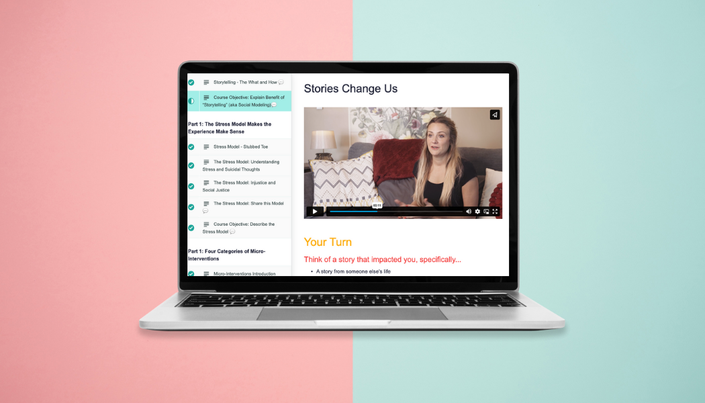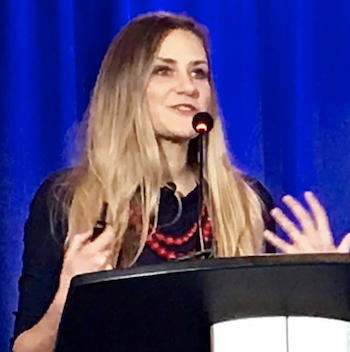
Community Course: Making it Matter with Micro-Interventions
Building Resilient Communities with DBT Skills and Micro-Interventions
Enroll Now
What Is This Course?
Small Steps to Big Changes: In this 2-hour on-demand course, we’ll practice simple ways to manage common community problems such as loneliness, stress, relationships, and mental health and substance-use struggles (including suicidal thoughts). You’ll learn how to help yourself and others prepare for, survive and grow through challenging times.
Training Schedule & Requirements
The course takes at minimum a week to complete and can not be completed in one sitting. This is so you have time to practice the Micro-Interventions.
- "Public" comments
- Practice in your daily life
- Quizzes & reading emails
- Feedback on course
When you finish all steps, you will receive a Course Certificate.
Who Should Join?
If you’ve struggled with mental health or substance use, or if you’re a friend or family member of someone who has, you’re also welcome to take this course. It’s also great for anyone who wants to learn a few coping tools called DBT Skills.
Healthcare service providers can take this course or the more clinically oriented version found here.
Objectives
At the end of this course, participants will be able to:
- Name the Four Types of Micro-Interventions
- Tell 3 DBT Skills apart
- Explain why “storytelling” is important
- Use Do It Now to learn and teach new ways to cope
- Remember what makes up a Caring Contacts
- Describe the Stress Model
- Be better at balancing hope and change (Linking Statements)
- Teach the Stop, Drop, and Roll for emotional fires
Become an Ambassador
Complete of this course well, and you have done the first step in becoming a NowMattersNow.org Ambassador. You absolutely do not have to want to become an Ambassador to take the course. Learn more about Ambassadors here.
Quality Improvement and Research
As part of this course your data will be used to make course improvements. Your de-identified data may be used for research purposes (i.e. to evaluate the impact of the training). Data Examples: surveys results, engagement and participation descriptives, and demographic information
Please use Google Chrome or Mozilla Firefox for best course experience. See FAQ for more info.
Course Curriculum
-
StartWelcome! 💬
-
StartCourse Activities and Requirements 💬
-
StartCourse Outline and Objectives: Part 1 💬
-
StartCourse Outline and Objectives: Part 2 💬
-
StartCourse Outline and Objectives: Part 3 💬
-
StartFamiliar with DBT? 💬
-
PreviewDBT as Life Worth Living 💬
-
PreviewEmotions During this Course
-
StartGlossary
-
StartCarry It Forward
-
StartNowMattersNow.org Certification
-
PreviewTechnology Notes
-
StartStorytelling - Opposable Thumbs
-
PreviewStorytelling, The Why: Part 1 💬
-
PreviewStorytelling, The Why: Part 2 💬
-
StartStorytelling, The Why: Part 3
-
StartI'm a Private Person 💬
-
StartStorytelling - The What and How 💬
-
PreviewCourse Objective: Explain Benefit of “Storytelling” (aka Social Modeling)💬
Frequently Asked Questions
Your Instructor

Dr. Ursula Whiteside is a licensed clinical psychologist, CEO of NowMattersNow.org and Clinical Faculty at the University of Washington. As a researcher, she has been awarded grants from the National Institute of Mental Health (NIMH) and the American Foundation for Suicide Prevention. NowMattersNow.org is a website she developed with colleagues that includes skills for managing suicidal thoughts based on Dialectical Behavior Therapy (DBT) and paired with Lived Experience stories.
Clinically, she began her training with Dr. Marsha Linehan in 1999 and later served as a DBT-adherent research therapist on a NIMH-funded clinical trial led by Dr. Linehan. Dr. Whiteside is a group and individual certified DBT clinician. Now, she treats high-risk suicidal clients in her small private practice in Seattle using DBT and caring contacts.
Dr. Whiteside is national faculty for the Zero Suicide initiative, a practical approach to suicide prevention in health care and behavioral healthcare systems. This program was recently described by NPR on a segment titled “What Happens If You Try to Prevent Every Single Suicide?” Dr. Whiteside serves on the faculty of the National Action Alliance Zero Suicide Academy. She is also a founding board member of United Suicide Survivors International.
As a person with Lived Experience, she strives to decrease the gap between "us and them" and to ensure that the voices of those who have been there are included in all relevant conversations: nothing about us without us.
